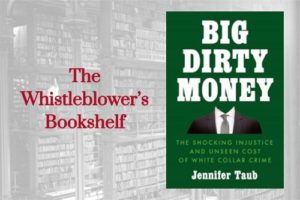Book Review: “Big Dirty Money: the Shocking Injustice and Unseen Cost of White Collar Crime,” by Jennifer Taub

The Constantine Cannon Whistleblower Team is pleased to introduce The Whistleblower’s Book Shelf, an ongoing series of reviews of books and other media that address fraud and aspects of the whistleblower odyssey. Please drop us a line if there is anything you would like to see us review!
It has become commonplace to see white collar crime cases, committed by big-name corporations and high-profile individuals, featuring prominently in national or international news. Stories like the blood-testing fraud at Theranos or the Wells Fargo account fraud scandal shook their industries. Although white collar offenses are on the rise, repeated corporate wrongdoing has become somewhat expected and seemingly acceptable with implicit immunity. Nowadays, if and when corporations are held accountable, they face much lower fines and their executives rarely face prison time. Many offenses disappear from the enforcement radar because of deferred prosecution agreements (DPAs) and non-prosecution agreements (NPAs). For corporate moguls, breaking the law and paying a fine has become a cost of doing business, and many well-heeled and privileged Americans use apparent unlawful behavior to attain and hold power and affluence. By contrast, those without money and power are the ones who end up being punished and imprisoned. These are the major themes running throughout Jennifer Taub’s important 2020 book Big Dirty Money: the Shocking Injustice and Unseen Cost of White Collar Crime.
In her book, Jennifer Taub, a law professor at Western New England School of Law, illustrates a prevalent and ostensible indifference of the American justice system to white-collar crime. As the author reports, white collar crime, such as fraud and embezzlement, costs U.S. victims around $300 to $800 billion per year, while street-level “property” crimes, such as burglary and larceny, which are prosecuted and enforced far more ferociously, cost around $16 billion annually. Although white-collar crime costs its victims an astounding amount of money, the real damage to society goes far beyond counting up the number of offenses or victims’ financial losses. This is because unpunished or under-punished high level officials in governments, businesses and non-profit sectors erode the trust of society in these institutions, which, in turn, undermines public trust in the rule of law underpinning our democracy.
Taub’s book presents a picture of a broken system, ruled by privileged white elites, which sustains the notion that some businesses are considered too big to fail and some high status individuals are too powerful to jail. It’s a culture which celebrates wealth accumulation and power-wielding where, too often, white collar crime is swept under the rug.
However, Taub also offers solutions for how to combat white collar crime and help clean up the public corruption problem. Among many suggestions, Taub advocates for exposing more corporate crime by funding independent journalists, banning forced arbitration clauses and expanding whistleblower reward laws which allow whistleblowers to bring legal cases on behalf of the U.S. government against corrupt businesses and claim a percentage of any funds recovered by the government.
The book underlines the importance of the power of whistleblowers and the need to incentivize and protect them. Taub emphasizes the pivotal role whistleblowers play in uncovering and reporting crime, as well as public corruption. She recounts the stories of famous whistleblowers, such as Daniel Ellsberg (Pentagon Papers), Mark Felt (Watergate scandal), Sherron Watkins (Enron), Susan Fowler (Uber) and Karen Silkwood (Kerr-McGee), all of whom exposed fraud at the highest levels of power at great personal cost. Indeed, whistleblowers often risk their careers, financial well-being, future prospects and, in the most extreme cases, lives, all in the name of exposing the truth and uncovering wrongdoing for the greater public good.
Taub writes “[whistleblower] protections aren’t just a matter of ethics and fair play – whistleblowers are the keys to saving lives and saving money big-time.” Taub proposes to give standing to employees (or other individuals with knowledge of wrongdoing) at all companies in the U.S. (not just those contracting with the government) to sue for fraud which would then allow the appropriate regulator to decide whether to act on the case and share any recouped gains with the whistleblower. In the author’s view, this would be a better and more effective solution than the current patchwork of different whistleblower laws in the U.S., including the primary whistleblower reward programs (the False Claims Act and the whistleblower programs of the SEC, CFTC, and IRS) and numerous other federal and state whistleblower laws in key industries.
According to Taub, in today’s turbulent times when journalists and whistleblowers are under constant threat and the level of disinformation is unprecedented, and crimes like fraud, bribery and money laundering are rampant in corporations, laws that protect and empower whistleblowers should be especially enhanced and expanded. Governments also need to step up to investigate, prosecute and hold those who commit crimes to account. Solving the problem of white collar crime will also require a shift in the culture that glorifies success, wealth and power. As Taub writes “absolute power corrupts absolutely” and concludes it is imperative to empower and encourage law enforcement to ensure that nobody is above the law and there is no implicit immunity for the upper class.
Read More
- The Constantine Cannon Whistleblower Team
- Whistleblower Reward Laws
- Think you have a whistleblower case?
- Contact us for a confidential consultation
Tagged in: Importance of Whistleblowers, Whistleblower Bookshelf,